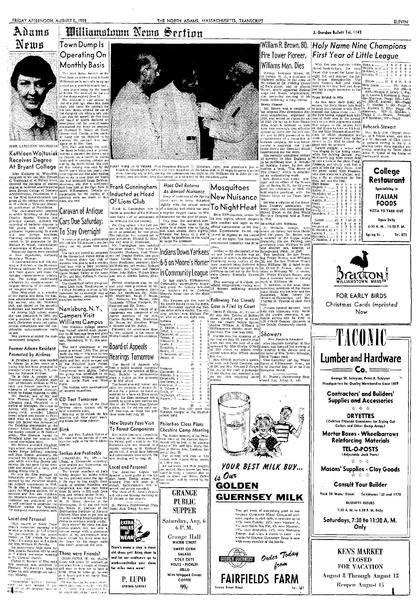I don't recall which celebrity had supposedly died, but a wire service had scooped the competition with an obituary and the news spread from there. Soon thereafter the celebrity issued a press release, not as witty as "the report of my death was an exaggeration", but in the same vein. Red-faced, the news service retracted the obituary. I suspect they eventually republished the obituary more-or-less verbatim when the personality passed away, much like an accountant getting a customer's credit off the books.
What I do recall is that this celebrity's obituary was rather lengthy and complete, far too polished to have been the product of a harried all-nighter. This led to my interest in how newspapers craft obits well ahead of the subject's death. At some point I scribbled this muddled note in my writing notebook:
"The Obituarist – Dying, old age, writes obits for living ppl. Also writes fiction—short stories?—and has come to realize that man is reliant on conflict, tension, etc. because all our stories rely on them, and they are not stories otherwise. Speaking to a young person writing his obit. (Or he writes book reviews.)"
The middle bit about conflict and tension regards my initial impulse to write about some "established" structure of the obituary itself (similar to how screenwriters follow a strict three-act form) and not the obituarist himself. This rambling note, largely a dead-end, was followed by another brief list of dead-ends, and there the idea lay fallow for a year.
On occasion I revisit my writing notebooks for inspiration, and I often found myself tumbling this obituarist and his situation about in my mind. Many of my stories evolve from my own (sometimes misplaced) attempts to wire two or three bits of disparate inspiration together and see if sparks fly. This time I was obsessed with one detail, one oddity, this profession of writing about living people as though they were dead.
I wanted to know if this grim duty was a primary occupation or one-off work for idle journalists. I wondered if anyone would actually aspire to join the ranks of obituarists, or if junior journalists were lassoed into the role because more senior writers could take a pass on such bleak work. I did a bit of research, online and at the city library, and discovered that this particular field of journalism is remarkably underdocumented. Obituaries are a perverse and morbid obligation, one newspapers are obviously reluctant to discuss. In fiction voids can be filled in with imagination, like spackle covering up a crack in a wall, but with so little to work with I fretted I would muff the basic facts of my story's subject matter.
A. O. Scott said "a great obituary is like a novel in miniature." What would a writer learn after penning these miniature novels for thirty years? Compressing lives into column inches, never receiving a byline, not even being a full-fledged member of the newsroom, merely earning a check when someone famous died? There seemed much internal conflict there, but I wanted that conflict to be tangible in form. I found that externality in the obituarist's computer, a Documents directory overflowing with word processing files, his life's work, and the bulk of them unpublished. His regret and resignation is that he will not live long enough to see them all in print. With all these charged ions firing, it only took a couple of drafts to shape "The Obituarist" into the story North American Review graciously published in the fall of 2009.
Shortly after NAR's acceptance (but before publication), Slate magazine wrote a revealing article on how obituaries are written. I was relieved to learn that the basic facts I'd imagined for my story landed close to the mark.
In April, a journalist friend of mine linked via the social networks to one of Mickey Rooney's obituaries. Associated Press noted the obit was penned in part by a reporter who'd died before it was published.
http://www.slate.com/articles/news_and_politics/explainer/2009/08/early_deadlines.html
http://www.scpr.org/news/2014/04/06/43323/la-coroner-actor-mickey-rooney-93-has-died/
Jim Nelson's work has appeared in North American Review, The Erotic Review, Watchword, Instant City, Switchback, and more. His books include the short story collection, A Concordance of One's Life and the novella Everywhere Man. His upcoming novel Edward Teller Dreams of Barbecuing People will be available in October 2014. A native of California, he lives in San Francisco. He can be located on the web at http://j-nelson.net.
Image from: Wikimedia Commons



